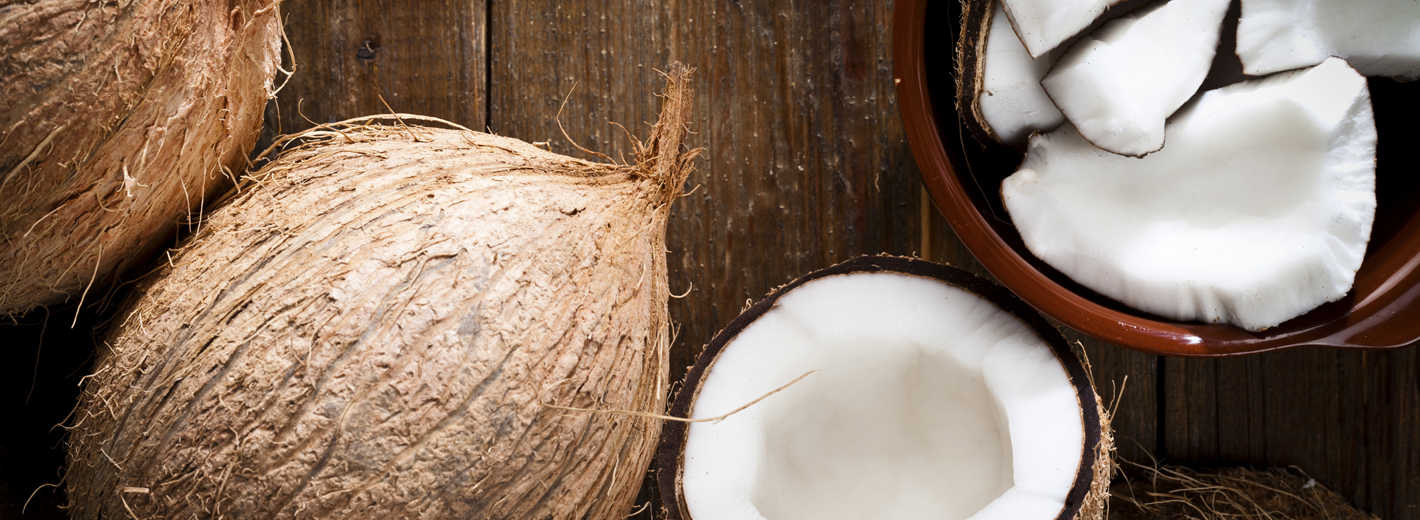
Ask the Superfoodies: Should I Go Nuts for Coconuts?
- by bonappetit
Coconut products are becoming really popular, but I hear they’re high in saturated fat – should I be concerned?
Coconut is having a moment. So much so that a popular food magazine recently deemed coconut the new quinoa. From cooking and baking with coconut oil, flour, and sugar to drinking coconut-milk smoothies and lattes, the fruit has taken center stage as the latest “super food.” Its products have been touted as able to improve cholesterol, speed up your metabolism, burn abdominal fat, kill harmful bacteria, and leave you with perfect hair, skin, and nails.
But before you replace all of your pantry staples with those from this tropical fruit, let’s take a closer look at the science.
Coconut Oil
Coconut oil is 90% saturated fat — the same type of fat that the 2015 Dietary Guidelines recommend limiting. The makeup of this saturated fat, however, is different than what is found in animal products. Nearly half of coconut oil’s saturated fat is from medium-chain triglycerides (MCTs), which are metabolized differently than the long-chain saturated fatty acids found in animal products. Some research has shown MCTs raises the “good” (HDL) cholesterol, but the “bad” (LDL) cholesterol increases at the same time — a net neutral effect. Even so, the type of MCT in coconut oil is different than the type used in most of the research, so it’s difficult to say that coconut oil will improve one’s cholesterol profile. In addition, the other half of the saturated fat in coconut oil is made up of long-chain fatty acids (similar to the amount in butter), which has been shown to increase LDL, a risk for heart disease.
One small study that tested the effects of coconut oil on cholesterol profiles suggests that coconut oil may improve cholesterol more than soybean oil. However, the women in this study lost weight during the time period, likely due to a reduction in calories and increase in exercise, not from eating coconut oil. The weight loss may have played a role in their improved cholesterol. Some believe that due to the way MCTs are metabolized, they can increase metabolic rate and may be used for energy more readily than other types of fat, aiding weight loss. Research does not support this. The effects of replacing other good-for-you plant oils like olive oil with coconut oil are not yet clear.
If you like the flavor of coconut, coconut oil is a nice substitute for butter or other sources of fat when cooking or baking. However, it still contains 120 calories per tablespoon (similar to other plant oils), so it should be used in moderation. Until further research is done, choose other high-quality plant oils like olive oil, avocado oil, and flax-seed oil over coconut oil most of the time.
Other coconut products
Coconut sugar: Made from the sap of the coconut tree, it tastes similar to brown sugar. Coconut sugar has gained popularity in the marketplace thanks to the claim that it has a lower glycemic index than cane sugar. However, as the American Diabetes Association and other health experts note, it shouldn’t be treated any differently than other sweeteners, as it provides the same number of calories per teaspoon.
Coconut milk: In the midst of the non-dairy milk craze, coconut milk has gained mainstream fans. Similar to coconut oil, it is high in saturated fat. While it offers minimal protein, it does provide a variety of vitamins, minerals, and phytonutrients. It can be a tasty addition to cooking, but it clocks in at 550 calories per cup — compared to 150 calories per cup of whole cows milk, or 100 calories for 1 percent — so use sparingly, and choose the “light” version to keep calories in check.
Coconut flour: A gluten-free flour alternative that provides 5 grams of fiber per 2 tablespoons, coconut flour can add a rich flavor to baking. It may be a better alternative to white flour, as it appears to have less of an effect on blood sugar. That said, coconut flour isn’t going to make an otherwise sugar-filled, high-calorie baked item “good” for you.
Coconut water: A refreshing drink that can be part of a healthy diet, but remember that even though it doesn’t have the saturated fat of the oil or the milk, it isn’t calorie-free, either. While it’s marketed as a sports beverage, partly for its potassium content, it lacks the sodium and amount of carbohydrates that many athletes need during a prolonged sweat session. However, paired occasionally with a meal or used in a smoothie, it can be part of an exercise recovery plan or just a delicious treat.
While coconut products can be part of a healthy diet, don’t go nuts for all the hype. Enjoy in moderation, particularly when it adds authenticity to a dish from a specific cuisine (like Thai) — and remember that no single food will solve all health problems!
At Bon Appétit, we know there’s a lot on your plate that you worry about. That’s why we have a team of registered dietitian nutritionists, aka our “superfoodies,” ready to answer your nutrition questions about which food choices will help you avoid unwanted pounds, work or study (and sleep!) better, and form long-lasting healthy eating habits. Email your questions and feedback to [email protected].